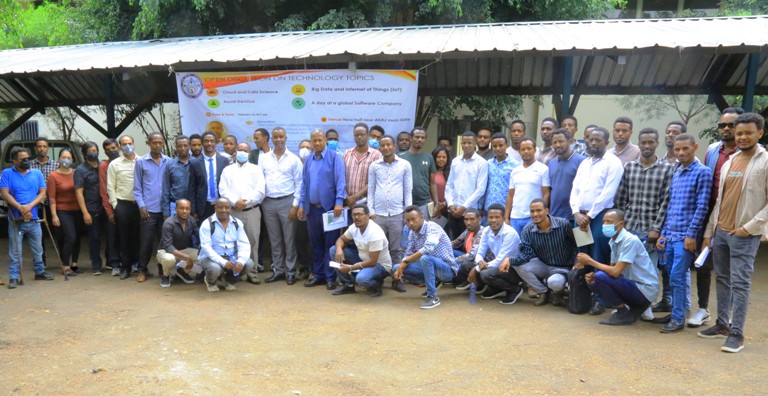Big Data is characterized by 3 key components – huge volume, fast velocity and veracity that add value to the business that should also have variability. Companies using Big Data have an edge over their competitors as they get differentiating insight and being wary of customers’ need, they optimize operation using available resources and stay undisputed in the market, said, Mr Denekew Jembere, delivering lecture on ‘Emerging Technologies’, at New Hall, Main Campus on 11th February, 2021. Click here to see the pictures
The program begun with introduction of the technocrat, Mr Denekew Jembere, wherein he was lauded for his professional acumen by Academic Affairs Vice President, Dr Alemayehu Chufamo, who said, AMU must get linked with former’s strong network as he has been sensitizing Ethiopian universities about the significance of emerging technologies by lecturing, imparting trainings, writing articles, blogs, etc. That apart he is involved in humanitarian endeavors like feeding school kids and offering assistance to those affected by Covid-19 pandemic.
Mr Denekew continuing his talk adds that, today, it’s challenging for many companies as new players with different innovations are emerging in the market and their success is depending on the way they process data and extract insight out of it. Citing an example, he said, the stock value of Facebook is higher than the Microsoft, despite the fact that its share isn’t that big, but it shows how it’s exploiting customers’ data to its advantage.
At the outset, he informed that Big Data is generated by large network-based systems that can be either structured or unstructured. If it’s unstructured, artificial intelligence from the Cloud Computing provider may be used in addition to machine learning to standardize it. And from there, it can be further harnessed through the Cloud Computing platform and utilized in a variety of ways.
Dwelling into Data Science, he said, it basically deals with data and working with engineers and business managers to come up with a model that adds insight to enable users to do things in an intelligent manner. It’s all about how you transform it and use an algorithm to train a model.
Highlighting Azure Data Bricks, he said, this platform enables machine learning and big data processing; with it, we can build application called ‘anomaly detection’ to spot anomalies in the financial transactions in banking sector and ensure trust. Anomaly detection can be good topic for Master and PhD students to gather data from banking industry and using algorithm build a model that enables financial industries to find out whether their transactions are trustworthy or not.
In Ethiopian context, he said, reliable Information Communication Technology (ICT) infrastructure enables Small and Medium Enterprises (SMEs) to collect and process transactional and operational data to generate insights used for better decision making, but its absence leaves SMEs rudderless that adversely impact public and privately owned businesses in Ethiopia that require consideration of both technical and strategic options.
And given the low-bandwidth & unreliable internet connection and the high-cost of using cloud computing for most SMEs in Ethiopia, the use of hybrid cloud and fog computing would have long-term cost-saving benefits for businesses and, increasing the headcount & quality of skilled workforce for the country, he emphasized.
Being the Technical Lead at Microsoft, he has created a customer-support application that brought him recognition and it has been christened after the name of his hometown - ‘Hossana Service.’ He exhorted the youth to make potential contribution to build Ethiopia and expressed his own desire to do the same.
He assured to impart trainings on Data Science, Internet of things and Azure DevOps across Ethiopia. He also dwelt upon On-premise, Cloud Analytics for Data Transfer, Big Data & Cloud Computing, Internet, Algorithm understanding and data transformation, etc.
The program begun with Arba Minch Institute of Technology’s Scientific Director’s Delegate, Dr Muluneh Lemma, introducing the speaker; AMU officials, staff members and students were in attendance.
(Communication Affairs Directorate)
